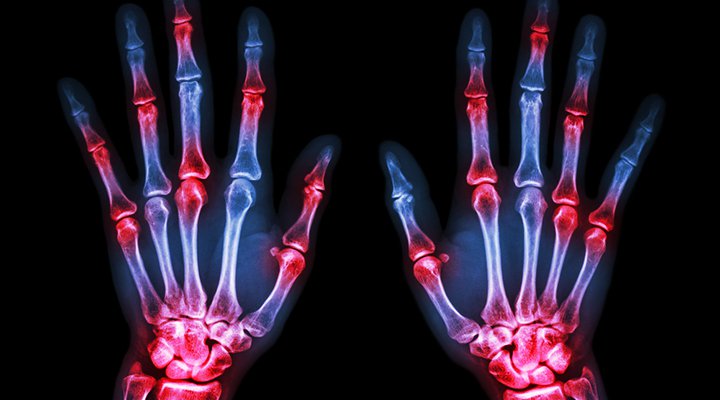Why Rheumatoid Arthritis is Vastly Different Than Arthritis

Rheumatoid arthritis is vastly different than what we simply call “arthritis”, which in most cases is the most common type – osteoarthritis. But while osteoarthritis affects the cartilage that serves as a sort of a “cushion” between the two opposing ends of the bones of a joint, rheumatoid arthritis can damage a number of other body systems as well along with your soul.
If you’re searching for a clinical trial, for example, you have to be really specific, as our search engine comes up with 576 clinical trials for “arthritis”, but as much as 370 are targeting rheumatoid arthritis in particular.
So, first of all, what exactly is rheumatoid arthritis and what are the dangers?
Well, for one thing, rheumatoid arthritis doesn’t keep its business in your joints like “oh, no, I already damaged the skeletal system, I think that’s quite enough” – nope. In some people, rheumatoid arthritis also damages the skin, eyes and even the blood system. But why? For starters, because rheumatoid arthritis is an autoimmune inflammatory disease. What this means is, the immune system’s natural response to outside threats is mistakenly targeted at the body’s own tissues. RA (rheumatoid arthritis) affects the lining of the membranes around joints (synovium) and can lead to deformity as well as bone erosion and, of course, chronic pain. But because it’s an inflammatory disease, the inflammation itself is not contained in just one area and can easily damage other parts of the body as well.
Explore your new source of RA supportWhile it is yet unknown what causes RA, it is largely accepted that certain genes can make you more likely to develop this autoimmune inflammation due to outside factors which can trigger the disease, such as viruses. Some of the risk factors are gender and age – women between 40 and 60 years of age are more likely to develop RA, compared to men (even in the same age group). Other risk factors are, as always, family history of RA, smoking and obesity. And while none of these alone will trigger the development of the disease if there is no genetic predisposition, smoking, for example, has been shown to increase the severity of the symptoms in people who do develop it.

And because RA is not curable yet (although, with 370 clinical trials for it worldwide, a cure might be on its way), early diagnosis is very important. If you have a family member who suffers from RA, are a woman over 40, a smoker or have obesity, do not immediately go into panic, but be aware of the following:
- RA fist develops in the smaller joints (in the hands and feet) and is characterised by pain, swollen tissue around the joints, reduced joint function and range of motion, unusual warmth and tenderness in those areas.
- Joint stiffness, which is more severely experienced in the morning and after periods of physical inactivity.
- Fatigue, fever and even weight loss are possible.
- Symptoms are not limited to the joints in about 40% of the cases and can be experienced in other parts of the body including skin, heart, lungs, eyes, kidneys, salivary glands and so on.
- Sometimes the signs come and go, periods of remission can be followed by periods of “flares” – increased severity of the symptoms.
- If you have RA, you are usually twice as likely to get depressed as people without this inflammatory autoimmune disease. That’s no surprise, taking into consideration that living with chronic pain, and potential disability, can make you feel helpless. However, studies say that the connection might be more complex than that. This is why we will be talking about RA and depression more in a some of our following blog posts.
There is no end-all cure yet, so the main goal of the available treatments is to reduce the pain and inflammation, so as to allow patients with RA to keep leading the life they’re used to as much as possible. Early medical interventions have shown to improve outcomes and as treatments are to a large extend customisable depending on the individual development of the disease in each patient, raising awareness and being well educated about symptoms, risks and available options is more important than ever.
We at FindMeCure genuinely believe that a cure for most of the currently incurable conditions is not only possible but well on its way and just a bit more research down the road, so if you’re interested in all the available options when it comes particularly to RA, we’ll keep you updated. Don’t forget to check out our blog for the next post on RA clinical trials in the US and UK.
Explore your new source of RA supportWith all the medical advancements in recent years, the future of health indeed looks brighter. Check it yourself by searching for clinical trials for any condition in the field below:
For more related articles by FindMeCure, please take a look at the links below:
Over 550 Clinical Trials Are Working on New Arthritis Therapies. Will Any of Them Find a Cure?
“I Thought The Life I Knew Is Gone Forever” – Living With Chronic Pain
There is More to me (Than the Illness)
We Are Losing 1 Person Every 40 Seconds to Suicide. Can We Stop It?
How to Get Innovative Treatment When You Don’t Qualify For The Clinical Trial
I Am Considering a Clinical Trial. What Are My Rights?
Article by Nelly Katsarova


[…] a previous blog post, we promised to give you more info about the treatments for rheumatoid arthritis that are currently […]
My husband played a lot of Football as a young boy & right up until he was in his late twenties….. would that cause Rheumatoid Arthritis which he had & suffered very much…..His pain was so intense…Would be interested to know…Thank you…..Mavis Ritchie…..Mavisrit@telus.net
Hey Mavis! RA is an autoimmune disease and there is no existing proof that it is caused by any physical activity. Actually, nobody knows what exactly is the reason for one to develop RA. If you are interested in more details, please visit our dedicated RA page: https://www.findmecure.com/conditions/rheumatoid-arthritis
Having flares sounds like a really painful thing to deal on your own. It makes sense that you would want to look into getting relief from your symptoms. My sister would love knowing this as she looks into arthritis treatments for a loved one.
It got me when you mentioned that rheumatoid arthritis is dangerous because it does not stop in the skeletal system and that sometimes it damages the skin, eyes, and blood as well. If that is the case, then I think my friend needs to go to the professional for a checkup. She has a family history of rheumatoid arthritis. At least, now I know that she needs to take it seriously since she doesn’t seem to be concerned too much about it.